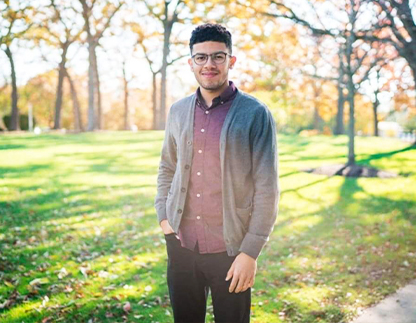Be patient. Learn what you love. Give yourself room to make mistakes and don't foreclose on anything. ”
Josiah Rosario (he/him)
PhD Candidate in the Department of Psychology

Josiah Rosario is a PhD candidate in the Department of Psychology in the Weinberg College of Arts and Sciences. He is a member of the Development of Identities in Cultural Environments (DICE) Lab under Dr. Onnie Rogers and the Destin Lab under Dr. Mesmin Destin. His research primarily focuses on understanding how people’s environments shape their academic and psychological outcomes. Josiah is a student laureate of the Lincoln Academy of Illinois, the highest honor given by the state of Illinois. Find him at https://josiahrosario.com/.
How would you describe your research and/or work to a non-academic audience?
I study how young people and their psychology are affected by the world around them. In particular, I investigate how racialized and politicized realities in society affect their identities and academic outcomes.
Tell us what inspired your research and/or work.
My work is inspired by the many scholars that came before me. I draw on the work of Black psychologists and scholars dating all the way back to W.E.B. Dubois and critical scholars like Paolo Freire and Franz Fanon. Their intellectual and scholarly leadership continues today through the work that my colleagues and I do.
What is a mistake you have learned from in your career?
A mistake I have learned from in my career is not being patient or empathetic with myself. Being in a highly intense and competitive research environment means that the pressure to produce and perform is significant. However, in both life and research, failure is a common experience. You have to be patient and empathetic with yourself when you fail. Impatience and cruelty only lead to more failures and distress.
What do you find both rewarding and challenging about your research and/or work?
I find it incredibly rewarding to do work with and for Black and Latinx children whose lives have often been erased or mischaracterized by scientific research. The challenge in doing this work is to do it in a way that further empowers rather than disenfranchises these communities.
What inspires you?
My ancestors, community, and family inspire me. Many of my experiences, professional or otherwise, have been shaped by people, cultures, and languages that I carry with me into academic and research-related spaces. I am the product of my community and am proud of that. I also am inspired by the Black scholars, abolitionists, and intellectuals who paved the way for me to be here and worked for a world many of them would never see, but that I would enjoy.
How would your closest friends describe you?
I would hope that my closest friends would describe me as someone who is kind and thoughtful. I would hope that they would view me as someone they can trust and rely on—that I am a deep thinker and feeler. I also trust that they would describe me as warm and welcoming.
What did you originally want to be when you grew up?
I wanted to be a "scientist" but in reality I wanted to be a mechanical engineer who designed the next generation of automotive vehicles. I would sit around drawing "floating cars" in notebooks and imagining what technology was needed to make it happen. Little did I know I would actually become a scientist—one most kids would probably find boring!
What advice would you give your younger self or someone considering a similar path?
The advice I would give my younger self and others considering similar paths is: Be patient. Learn what you love. Give yourself room to make mistakes and don't foreclose on anything. Embrace growth and change.
Published: November 22, 2022
If you know a graduate student, postdoctoral trainee, graduate faculty member, staff member, or a member of our TGS alumni population who would make a great candidate for our TGS Spotlight Series, please complete this brief TGS Spotlight Series Nomination Form.